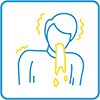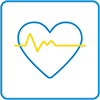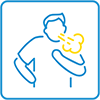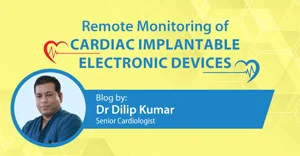Comprehensive Heart Disease Treatment with Angioplasty at Medica
The term “angioplasty” refers to the use of a balloon to open a narrowed or blocked artery. These days, angioplasty procedures, however, also include inserting a short wire-mesh tube, known as a stent, into the artery during the procedure. The stent is permanently implanted
to allow blood to flow more freely. Interventional cardiologists use a catheter, which is a long, thin tube with a small balloon on the tip to perform a ‘Balloon Angioplasty’. They inflate the balloon at the site of the artery blockage in order to flatten or compress the
plaque against the artery wall. If the doctor determines that a stent will help keep the artery
from closing or re-closing, then a stent is also placed to support the artery.
Free Doctor Assessment
Why is There a Need for Angioplasty?
It is a type of surgery done in urgent situations, such as a heart attack. Angioplasty is also known as percutaneous coronary intervention (PCI). Angioplasty is a usual treatment method in the case of coronary heart disease (CHD) or heart attacks (acute coronary syndrome).
But most angioplasties are done to patients who have blockages in the arteries. Patients who show symptoms of have blocked blood vessels of the heart are usually suggested to get an angiogram to locate all the blockages. It also helps in ascertaining the magnitude of the heart blockage(s).
Symptoms of Clogged Arteries
The following are some of the symptoms of clogged arteries:
Types of Angioplasties
Pre-surgery, the individual is made to undergo a series of tests, that includes getting an angiogram, blood tests, etc. Following the outcome of your reports, our cardiac specialists will accordingly employ a treatment plan.
Angioplasty with stenting has changed the cure of coronary artery disease. Majorly two types of angioplasties:
- Balloon Angioplasty: Balloon angioplasty is the procedure to widen the arteries. The doctor inserts the catheter with a small balloon on its tip. As the catheter reaches the area of blockage, the doctor inflates it. It results in the widening of the artery at the site of the blockage.
- Stent Placement: The doctor places the stent in the artery to keep the blood vessel open. The doctor permanently places the stent in the arteries. These stents are made of metal or plastic mesh-like products. The doctor places them in larger arteries. Stents are very useful in the various treatment arteries and other problems.
It is a surgical method to keep the blood vessels that supply blood to the heart muscle open. Doctors usually perform this procedure just after a heart attack. There are high survival chances in patients who have angioplasty surgery immediately after a heart attack. Therefore, there should not be any delay if the patient has a heart attack. It is suggested to immediately see a physician if you are showing symptoms of cardiac arrest.
What are the Risks Associated with Angioplasty?
The risks associated with Angioplasty are:
- Allergic reaction after anaesthesia or with dye
- Bleeding
- Tissue discoloration, blood clot in the stent
- Abnormal heartbeat
- Injury to a blood vessel, heart valve, or artery
- Heart attack
- Kidney damage
- Infection
- Breathing problems.
- Re-tightening of the artery.
- Damaged artery
Given the medical history and current condition our skilled doctors perform this complex surgery with precision that stems from years of experience and successful angioplasties. Medica is one of Kolkata’s most trusted centres for such types of cardiac procedures.
Procedure
Angioplasty is a vascular intervention that is typically performed in a minimally invasive or percutaneous method after the angiograms confirm the presence of blockages in one’s heart and surrounding blood vessels. In addition to ballooning, a stent may also be placed during angioplasty. This procedure is performed in a CATH lab by an interventional cardiologist assisted by trained nurses and technicians.
Treatment at Medica
Each year, our team of renowned cardiologists diagnose and treat over hundreds of adults and children. We are also giving our best to provide treatment for highly complicated cases.
Angioplasty helps to:
- Open up the shrunken arteries
- Relieves chest pain
- Help out to in treating patients who have had recent heart attacks
And the benefits of Angioplasty are:
- It is less invasive procedure
- Surgery is less expensive
- Local anaesthesia is used (other types of heart surgery require general anaesthesia)
- Very small incision is required
- Shorter recovery-time

Minimally Invasive
Surgery

World Renowned
Experts
EMI Facility
Available

Covid Safe
Environment
Conditions Treated through Angioplasty
- Coronary Angioplasty: Percutaneous coronary intervention (PCI) is a treatment for narrowed or blocked coronary arteries caused by cholesterol-laden plaque build-up. PCI for stable coronary artery disease reduces chest pain but not the risk of death, myocardial infarction, or other major cardiovascular events.
- Carotid Angioplasty: Carotid stenting is performed in patients who have carotid artery stenosis and are at high risk for carotid endarterectomy.
- Angioplasty of the Renal Artery: This procedure is used to treat atherosclerotic narrowing of the renal artery with or without stenting. Renal artery stenosis can lead to hypertension and kidney function loss.
- Angioplasty of the Veins: This is done to treat subclavian vein stenosis caused by thoracic outlet syndrome.
A moderate amount of cardiac blockage is often in the 40-70 percent range
Seek help from an expert
Results with Angioplasty
If there are no complications, patients will be discharged the following day. The sheath is removed after the puncture site is checked for bleeding. Patients will be asked to walk around after 2-6 hours and will be able to resume normal, non-strengthening activities in a week. After two weeks, the patient can start doing low-level exercises.
Our dedicated team of doctors and nurses will be with you at every step of your recovery. Our care extends beyond the time you have spent at our hospital. Our doctors will ensure your rapid recovery even after getting discharged.
The patient should follow the instructions given below:
- Strictly NO to smoking.
- No to alcohol
- Low cholesterol levels to be maintained
- Maintain a healthy weight.
- Must keep diabetes and high blood pressure under control.
- Keep the area of the surgery site dry at least 24 to 48 hours
- Plenty of water intake
- At least for a week, avoid swimming or bathing.
- Avoid Stress
- Get a sound sleep and rest your mind as much as possible
- Take heart-protective nutrients such as vitamins, minerals, antioxidants, and a high fiber diet.














